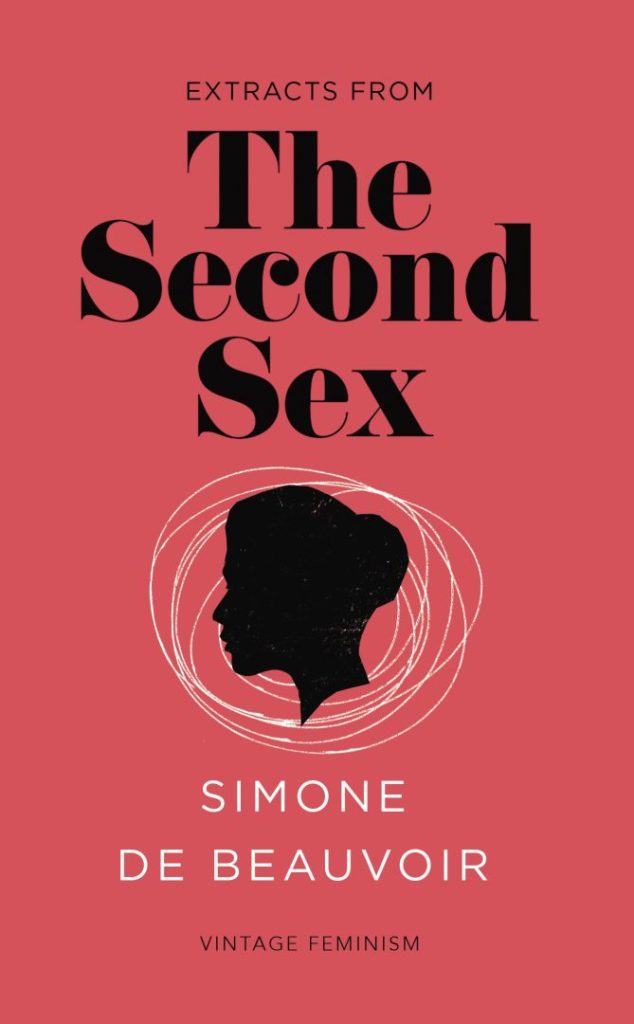
Table of Contents
Buy as E-book, Paperback, or Hard-cover
A Foundational Text in Feminist Existentialism
Simone de Beauvoir’s The Second Sex (1949) stands as one of the most pivotal works in 20th-century philosophy, feminism, and existential thought. More than a critique of gender roles, it is a methodical dismantling of the myths, ideologies, and systems that have shaped the perception of woman as “the Other.”
In this expansive two-volume work, de Beauvoir asks a deceptively simple question: What is woman? Her answer, developed through existentialist, historical, psychoanalytic, and biological analysis, shakes the foundations of Western thought and reveals the philosophical construction of inequality.
“One Is Not Born, but Rather Becomes, a Woman”
This oft-quoted line distills de Beauvoir’s central thesis: gender is not a natural essence but a cultural and existential project. Through this insight, she revolutionizes the conversation around identity, freedom, and oppression.
Her analysis of how girls are socialized into womanhood through language, media, religion, education, and marriage exposes the historical and philosophical mechanisms by which male subjectivity defines itself in contrast to female alterity.
De Beauvoir draws on Hegel’s master-slave dialectic, arguing that man positions himself as the Absolute, relegating woman to the position of the inessential Other. This construct is not biologically mandated but culturally reproduced—a process that is both insidious and historically entrenched.
Philosophical Framework: Existentialism Applied to the Body
De Beauvoir’s intellectual scaffolding is firmly existentialist. Influenced by Sartre, she contends that freedom and transcendence define human existence. But whereas Sartre universalized the human condition, de Beauvoir grounds it in embodied experience—a move that makes her work uniquely radical.
She insists that the lived experience of the female body cannot be understood through abstraction. Menstruation, pregnancy, motherhood, and menopause are existential realities, not medical facts alone. Yet society has consistently mythologized these realities into traps of immanence.
To “transcend,” in Beauvoir’s sense, means to assert freedom through meaningful projects. Yet, women have historically been denied the structural conditions to realize this transcendence, thus becoming “the Other” not by nature but by imposed destiny.
A Systematic Demolition of Myths
De Beauvoir’s demolition of male-constructed myths about women spans literature, psychoanalysis, biology, and history. From Aristotle’s claim that the female is a “defective male” to Freud’s phallocentric theories, she critiques every major authority that has essentialized womanhood.
In the literary canon, woman is cast as muse, siren, saint, mother, or seductress—always object, never subject. She demonstrates how these myths enable men to project their own anxieties and desires onto women, reducing their full humanity.
This critique anticipates later feminist works by Luce Irigaray and Julia Kristeva, yet it also transcends them in scope and clarity. De Beauvoir is not merely deconstructing—she is constructing a path to agency.
The Role of Marriage, Motherhood, and Labor
The chapters on marriage and motherhood are among the most cutting and empirically grounded. De Beauvoir illustrates how these institutions, though often romanticized, function to limit women’s autonomy.
Marriage becomes a “mutual parasitism” where the woman serves as caretaker, sexual partner, and domestic laborer—her dreams often foreclosed for the sake of the household. Motherhood, similarly, is shown to be a mixed blessing: it offers purpose but often at the cost of freedom.
She is not anti-motherhood or anti-marriage; rather, she critiques the structural limitations and social expectations that confine women to roles of passive support.
De Beauvoir also devotes space to women’s economic conditions, arguing that true liberation must include access to meaningful work, financial independence, and bodily autonomy—including reproductive rights.
The Ethics of Ambiguity Revisited
The Second Sex revisits many ethical themes from The Ethics of Ambiguity—particularly the necessity of transcending imposed identities and confronting the ambiguity of lived experience. Here, de Beauvoir develops a feminist existentialism that insists on the centrality of choice, context, and freedom.
But unlike her earlier work, this is not just a theoretical map—it is a social and political manifesto. It calls on women not just to analyze their condition but to change it through solidarity, struggle, and revolt.
Strengths and Legacy
Strengths:
- Encyclopedic in scope: philosophy, anthropology, literature, biology, psychoanalysis
- Groundbreaking synthesis of existentialism and feminism
- Lays the groundwork for second-wave feminist movements across Europe and America
Limitations:
- Limited treatment of non-white and non-Western women’s experiences
- Some scientific content now outdated
- Relatively heteronormative by contemporary standards
Nevertheless, the ambition and clarity of The Second Sex remain unparalleled. It is a foundational text for any serious discussion of gender, power, and philosophy.
Who Should Read It?
- Students and scholars of philosophy, feminism, or gender studies
- Readers seeking a comprehensive critique of Western thought on women
- Thinkers exploring existentialism applied to social identity
- Anyone who believes that personal is political—and philosophical
TL;DR
The Second Sex is not merely a book—it is a confrontation. A confrontation with history, with ideology, and with the ways in which freedom is denied and must be reclaimed. Simone de Beauvoir’s legacy endures not because her questions are resolved, but because they remain vital. Her call is not only to understand—but to transform.
Leave a Reply